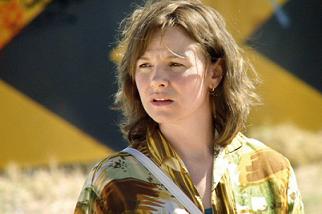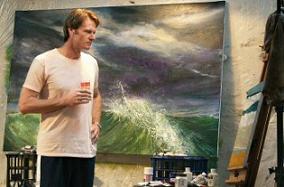

Most large ensemble movies, whether they be from Robert Altman or P.T. Anderson, are dramas, comedies, or some combination of the two. Few are like Look Both Ways, quite possibly one of the most depressing movies in recent history. At the beginning of the film, a train crash kills a number of people. Look Both Ways deals with how the crash affects the lives of a group of people in interconnected stories. It's very depressing, but writer/director Sarah Watt uses these emotions to explore the lives of her characters.
This is Watt's first feature length film, and it is an interesting debut. She has a background as an animator, and used these skills within the film. Meryl (Justine Clarke, Japanese Story, Danny Deckchair) daydreams about various ways she can die. A train runs her over, sharks eat her, or the floor collapses beneath her. All of her daydreams are animated in an almost child-like manner. Nick (William McInnes, Dirty Deeds) imagines montages of cancer cells, medical charts, and other assorted maladies.
There is also a dreamy way that all the characters act. Aside from a few interludes, most seem to be in some sort of trance. They are meditating on their mortality. Surprisingly, Look Both Ways manages to keep from being oppressively dreary. The characters are interesting enough to draw the viewer in. Although Watt does use a few too many musical interludes, and does so little with some of the characters that she may as well have left them out. This makes Look Both Ways feel padded at times, even though this is not the case.
Death seems to be present in everybody's life. Meryl, an artist, returning home from her father's funeral, witnesses a man jumping in front of a train. Nick, a journalist, still reeling from the recent death of his father, discovers he may have cancer. Worse, he will not get a clear answer until after the weekend. The third main character, Andy (Anthony Hayes, Ned Kelly, Rabbit-Proof Fence), a photographer dealing with a newly pregnant girlfriend and children from a prior marriage. Hayes gets a great scene where the emotions burst out of him and he lashes at a store employee, but overall, the movie belongs to Clarke and McInnes. The two share a budding romance that is impressively awkward. Both are uncomfortable around each other, and never know what to say. There is something very realistic about the way that Watt wrote the interactions, and Clarke's face portrays sadness wonderfully